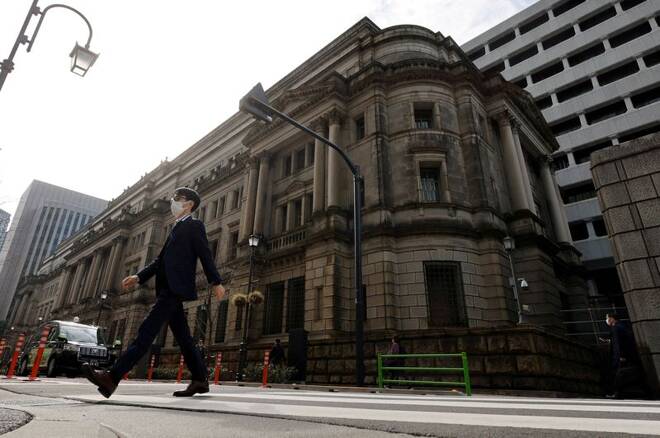Advertisement
Advertisement
BOJ debated feasibility of tweaking yield control in Jan-minutes
By:
TOKYO (Reuters) - Bank of Japan (BOJ) policymakers debated the feasibility of making further tweaks to its bond yield curve control with one member saying it must keep "various options in mind" on the future course of monetary policy, minutes of its January meeting showed on Wednesday.
By Leika Kihara
TOKYO (Reuters) -Bank of Japan (BOJ) policymakers debated the feasibility of making further tweaks to its bond yield control in January with one member saying it must keep “various options in mind” on the future policy path, minutes of its meeting showed on Wednesday.
The nine-member board also agreed inflation and wages could overshoot expectations, suggesting a phase-out of its massive stimulus remained on the cards when Kazuo Ueda succeeds incumbent dovish governor Haruhiko Kuroda next month.
But the board also saw the risk of companies failing to deliver big enough wage hikes to eradicate the public’s deeply entrenched deflationary mindset, the minutes showed.
“Members agreed there was high uncertainty over companies’ price- and wage-setting behaviour,” the minutes said.
At the January meeting, the BOJ maintained its ultra-low interest rates, including a bond yield cap it was struggling to defend, defying market expectations it would phase out its massive stimulus programme amid mounting inflationary pressure.
The board agreed it was premature to exit the ultra-loose policy, with inflation yet to sustainably achieve the BOJ’s 2% target, according to the minutes of the Jan. 17-18 meeting.
But many board members said distortions in the yield curve, caused in part by the BOJ’s aggressive bond buying to defend its yield cap, were yet to be fixed, the minutes showed, underlining their concern over the rising cost of prolonged monetary easing.
“At some point in the future, the BOJ must conduct an examination of its policy to determine the balance of its benefits and cost. For now, however, it was appropriate to maintain monetary easing,” one member was quoted as saying.
“The BOJ must keep various options in mind in guiding monetary policy. But with overseas economies slowing now, it’s inappropriate to rush towards an exit” from ultra-easy policy, another board member said, according to the minutes.
Under yield curve control (YCC), the BOJ guides short-term rates at -0.1% and the 10-year bond yield around zero as part of efforts to sustainably hit its 2% inflation target.
The January meeting was held at a time the BOJ was struggling to keep the 10-year bond yield from rising above its 0.5% cap, after its decision in December to raise the ceiling from 0.25% fuelled market expectations of a near-term rate hike.
Instead of tweaking YCC, the BOJ modified its funds-supply market operation in January to use it as a new tool to prevent long-term rates from rising too much.
While markets were expecting further modifications to YCC, making changes again so soon would make the future conduct of monetary policy unclear, one member was quoted as saying.
“It might be appropriate to scrutinise market functioning for now, and discuss (whether to change) the conduct of YCC if necessary,” another member said.
(Reporting by Leika Kihara; Editing by Shri Navaratnam and Muralikumar Anantharaman)
About the Author
Reuterscontributor
Reuters, the news and media division of Thomson Reuters, is the world’s largest international multimedia news provider reaching more than one billion people every day. Reuters provides trusted business, financial, national, and international news to professionals via Thomson Reuters desktops, the world's media organizations, and directly to consumers at Reuters.com and via Reuters TV. Learn more about Thomson Reuters products:
Advertisement
